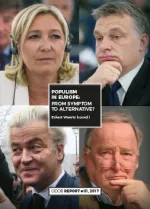Populism “made in the EU”

For some years now, populism has sat at the table with heads of state and government. Fed by EU funding, it has used the European Parliament as a high-profile platform for projecting Eurosceptic rhetoric. European populism would have been unable to reach the heights of representation and influence it currently enjoys without the money and political instruments provided by the European Union it seeks to destroy.
Access to European funds is key to understanding the gestation and rise of the Eurosceptic populist forces. In 2016 alone, the Movement for a Europe of Liberties and Democracy (MELD), led by Marine Le Pen's Front National, received €1.55 million as part of the annual subsidies granted by the European Parliament to cover up to 85% of expenses related to the European political agenda of EU political parties. Another group in the parliament, the Europe of Freedom and Direct Democracy (EFDD) – led by the British Eurosceptic party, UKIP – received €1.4 million. Although these contributions may only be spent on expenses connected to their European legislative work, repeated cases of corruption have revealed the fraudulent use of these funds by the members of UKIP. Likewise, Marine Le Pen has recently found herself embroiled in a legal scandal, with the European Anti-Fraud Office demanding she return €339,000 of European funds that, rather than being used to hire assistants in the parliament in Strasbourg, instead went towards funding her party.
Even the summit of populist “patriotic leaders” (Le Pen's words) held in Koblenz in January 2017 to announce the political assault these xenophobic and Eurosceptic forces hope to mount in various elections throughout the year, was paid for using European funds, EU Parliament sources admit. But, access to funding aside, to what extent have they managed to change the European Parliament’s politics?
For these populist forces, the Strasbourg chamber is more of a television studio than a workplace. In general, most of the MEPs in these groups – whether in Le Pen’s group, Nigel Farage’s or independents – have a poor record of parliamentary work and participation in the commissions in which legislative proposals are debated. Nevertheless, their capitalisation on their statements in the chamber – through the minutes on the floor the regulations afford all the parliamentary groups in the debates – has been so successful that they have managed to place their pro/anti-Europe ideological focus at the same level as the traditional right/left axis. The emergence of these populist forces and their electoral growth in the midst of a European economic crisis – and the resulting application of unpopular austerity programmes that widened the geographical divisions between member states – brought the large groups in the chamber (EPP, S&D and ALDE) to an almost uncritical consensus in opposition to the Eurosceptic rhetoric beginning to take a hold from the margins of the political debate. Thus, if for years, the metaphor used to describe the European Parliament was a monster with two heads – one ideological and the other national – this evolution of the populist rhetoric would have brought into being a third based on the anti- and pro-European division.
But though the European Parliament is the highest profile instrument, the real arena of political influence is the Council of the European Union. The European loudspeaker has allowed many of these populist forces to make themselves important players in their respective countries’ national politics. Eurosceptic, populist and clearly xenophobic parties currently govern in Hungary and Poland, are part of a coalition government in Finland, and are key players on the French, Dutch and Danish political scenes. It is from this decisive position – supporting governments, influencing political agendas and becoming the real alternatives to power – that populism, and its strategy of opposing European integration, currently manages to make its mark both on national politics and on the threatened European construction. The Eurosceptic party UKIP provides the textbook example of this indirect power: without having ever won a single seat in the Westminster parliament Nigel Farage managed to drag the British Conservatives into calling the referendum on the European Union.
The same European construction has created the necessary conditions to make the EU the recurring scapegoat for the multiple crises tormenting Europe. The states retain essential competences in migration, social security, culture and education policies. But nevertheless Brussels has taken the brunt of citizens’ discontent about Europe’s lack of response to the arrival of refugees from the war in Syria, the social inequalities produced by strict economic policies (these, at least,were dictated by the EU) and the unease about identity on which the populist forces have built their anti-European rhetoric. National governments’ old habit of using the abstract, depersonalised notion of Brussels to avoid taking responsibility for unpopular measures approved in their cabinets has now taken on a new dimension.
The Community method is being put to the test by governments and political parties that take refuge in the discourse of national sovereignty, the rhetoric of “taking back control” and place specific proposals on the table for renationalising competences and the democratic control of decision-taking.
Populism has not restricted itself to "fighting the EU from the inside", as its slogan claims, and it has done so using all the weapons the EU itself has placed within its reach.